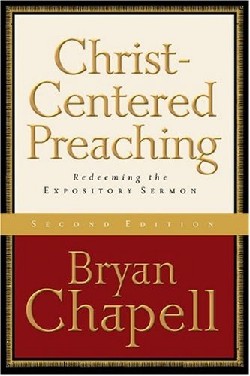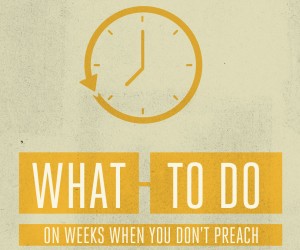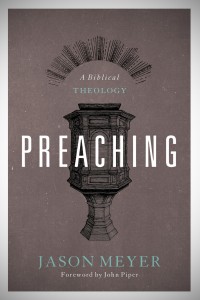 Bryan Chapell is the former president of Covenant Theological Seminary, the denominational seminary of the Presbyterian Church of America. His book Christ-Centered Preaching: Redeeming the Expository Sermon was first published in 1994, but has seen a renaissance in recent years as Christ-centered biblical theology has become popular in the broader evangelical world. Chapell’s main burden is to provide “principles for redeeming the expository sermon from the well-intended but ill-conceived legalism that characterizes too much evangelical preaching” (20). Thus, Chapell’s overall hope is to move preachers into an understanding and practice of preaching that centers the sermon’s content on the redeeming work of Christ.
Bryan Chapell is the former president of Covenant Theological Seminary, the denominational seminary of the Presbyterian Church of America. His book Christ-Centered Preaching: Redeeming the Expository Sermon was first published in 1994, but has seen a renaissance in recent years as Christ-centered biblical theology has become popular in the broader evangelical world. Chapell’s main burden is to provide “principles for redeeming the expository sermon from the well-intended but ill-conceived legalism that characterizes too much evangelical preaching” (20). Thus, Chapell’s overall hope is to move preachers into an understanding and practice of preaching that centers the sermon’s content on the redeeming work of Christ.
OVERVIEW
Christ-Centered Preaching consists of three parts: 1) Principles for Expository Preaching, 2) Preparation of Expository Sermons, and 3) A Theology of Christ-Centered Messages. In part one, Chapell distinguishes between word and witness, saying it is “the Word preached, rather than the preaching of the Word, [that] accomplishes heaven’s purpose” (27). The Word is not simply powerful; it is without peer in its ability to create and transform human beings. This Word is ultimately a witness to Christ. So then, if the word of God transforms people and Christ is central in transformation, then preaching out to ultimately be about Christ. It is in this section where Chapell unpacks his “Fallen Condition Focus” (FCF), his unique contribution to the field, which I will soon evaluate.
With the principles of Christ-centered exposition in place, Chapell moves on to give sound instruction for how to prepare such exposition. The section includes everything from a four-part process of study to the use of outlines to the proper employment of illustrations. The book concludes with two chapters devoted to developing a theology of Christ-centered messages. An aside here is that the book’s value would increase if part’s two and three were revered. In other words, it seems wiser to break up the book as the “What, Why, and How” of Christ-centered preaching instead of “What, How, and Why.” Nevertheless, in part three Chapell shows why he believes that every part of the Bible reveals truth regarding humanity’s fallen condition. Therefore, the purpose of Christ-centered exposition “is to decipher these redemptive signals so that listeners understand a text’s full meaning in the context of its God-glorifying, gospel intent” (273). Redemptive sermons help protect preachers from the moralistic “be like” sermons Chapell sees permeating the church. Redemptive exposition is based on three steps: 1) Identify the Fallen Condition Focus, 2) Specify the Christ Focus, and 3) Discern the Redemptive Purpose (299-305).
THE HINGE ON WHICH IT TURNS
Chapell is particularly effective when he calls preachers to value unity in their sermons by saying, “Each feature of a well-wrought message reflects, refines, and/or develops one major idea” (44). He knows that razor sharp precision to one main idea is no easy task; instead it is one that requires great discipline. “Boiling out extraneous thoughts and crystallizing ideas so that the entire message functions as a unity have tested many a preacher” (44). Yet, the testing is necessary to fight through because unity not only aids preachers, but it aids congregation as well. Chapell is well read in the rhetorical and homiletical history, thus he is right to believe that all good communication – including preaching – requires a dominant theme.
Chapell clearly demonstrates what unity is and is not when puts a preacher through his somewhat famous “3 A.M test.” This test requires the preacher to imagine a spouse, roommate, or church member waking him from a deep slumber in the middle of the night with this simple question, “What’s the sermon about today, Preacher?” Chapell writes, “If you cannot give a crisp answer, the sermon is probably half-baked. Thoughts you cannot gather at 3:00 A.M. are not likely to be caught by others at 11:00 A.M.” (47).
In Colossians 4:4 Paul asks the church to pray for him to preach clearly, “which is how I ought to speak.” Good communication is clear communication. Faithful preaching is clear preaching, and this Chapell understands. Not every sermon needs to be the genesis of revival that will fill history pages for years to come. Yet, in every sermon the preacher must be found faithful (1 Cor. 4:2), thus in every sermon he must be clear. Chapell is right to place such prominence on unity. But from where does such unity come?
Chapell is spot on when he says, “Determining a sermon’s subject is half done when a preacher has discerned what the biblical writer was saying.” It’s is one thing to know what the biblical author said, and another to know why he said what he said. To help the preacher understand the “why” of every text Chapell introduces his “Fallen Condition Focus.” He defines the FCF as “the mutual human condition that contemporary believers share with those to or about whom the text was written that requires the grace of the passage for God’s people to glorify and enjoy him” (50). Drawing from 2 Timothy 3:17 – “All Scripture is breathed out by God . . . so that the man of God might be complete” – Chapell says, “All Scripture has a Fallen Condition Focus” (49-50). Thus, the FCF “determines the real subject of a message by revealing the Holy Spirit’s purpose(s) in inspiring a passage. Ultimately, a sermon is about how a text says we are to respond biblically to the FCF as it is experienced in our lives – identifying the gracious means that God provides for us to deal with the human brokenness that deprives us of the full experience and expression of his glory” (50-51). The FCF is the hinge on which Chapell’s instruction turns, but is the hinge the right one?
On my first reading I sensed a pause in my soul when Captain Chapell beckoned me on the preaching boat marked “FCF.” It seemed to me that preparing for a sermon would become unnecessarily anthropocentric, always needing to look under the rock of each passage for humanity’s sin. Yet, the more I read and saw the FCF fleshed out my mind became less hesitant. Expecting objections along this line of thinking Chapell says, “An FCF need not be something for which we are guilty or culpable. It simply needs to be an aspect or problem of the human condition that requires the instruction, admonition, and/or comfort of Scripture” (52). Thus, the FCF can be anything from specific sins to grief to longing for Christ’s return to as desire to raise godly children. Identifying the FCF is integral to Christ-centered preaching because it will show the preacher the way in which the passage uniquely points to Christ. So the FCF is necessary because it leads the preacher to examine what the passage reveals about humanity’s need for redemption and what the text reveals about the God who requires redemption (284).
Although the hesitancy did lessen, I am still hesitant enough to not jump on that boat marked “FCF.” It is a novel and largely helpful concept to employ, but it seems likely to flatten preaching into a kind of one-note preaching. I can easily see some preachers employing Chapell’s technique and congregations hearing every sermon ending with the sound of, “You need to be redeemed in this area, and behold, Christ redeems you in this area.” Let it be said that there are far worse one note preaching styles and I don’t think Chapell is aiming for such an end. However, the preacher who constantly has on FCF glasses comes into the passage with a presupposition that can easily cloud the author’s original intent. How can a preacher employ the FCF in Genesis 1 and 2? In Psalm 93 where the entire focus is God’s majesty? If the FCF is a technique of application, then it will be employed to a useful end. Yet, if the FCF is a technique of interpretation, it will fog the preacher’s eyes from seeing the full-orbed majesty of the Scriptures.
The Puritans, as represented by William Perkins, understood the Christ-centricty of all Scripture and still managed to speak about seven different categories of application for every text. Chapell writes, “Keeping the FCF in view from the introduction through the conclusion will help keep application from dangerous steps off the path of exposition” (233). This is where subsuming the main point of the sermon into the FCF of the individual passage fuels monotonous content in preaching. Use the FCF for application, not interpretation.
WHY YOU SHOULD READ IT
The inherent issues in Chapell’s FCF, if I am reading them right, would lead me to recommend that pastors and seminary students read the book, just read it with discernment (as we should read every book!). The impact of Chapell’s book cannot be denied and I do think is deserved. When the appendices are included, the book covers virtually every area under consideration for the task of preaching. He even has wisdom for how to use a microphone, sound wisdom at that! The book will be uniquely helpful for a pastor or student descending from traditions or denominations where moralistic preaching is the norm. Moralistic preaching after all seems to be what Chapell is largely concerned about. Rest assured that his instruction will deflate moralism’s hot air balloon rapidly and effectively. If the only thing preachers take away from the book is to steer clear of moralism, Chapell has succeeded in his aim and served the church well.
Book Details







